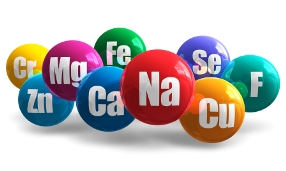Symptoms of Magnesium Deficiency
Did you know that over 90 percent of the world population suffer from magnesium deficiency? In the human body, over 300 biochemical reactions depend on this mineral. As such, magnesium has an impact on metabolism, blood pressure, and immunity. It is the view of some experts that a many health problems in the world today are associated with magnesium deficiency. The combination of lifestyle choices (such as the consumption of lots of caffeine and sugar), soil depleted of magnesium and the use of chlorine and fluoride in water have meant people ingesting less and less magnesium.

The following are some of the most common symptoms of magnesium deficiency:
That’s why you shouldn’t be quick to run to the medicine cabinet as soon as you start feeling a headache. Maybe you just need to restore your magnesium levels through supplementation and eating healthy diets. After all, magnesium has the ability to give you long-term relief from headaches and migraines. It is much better than taking pain relievers.
These symptoms may be easy to identify (or possibly not). If you become aware of any of them, talk to a qualified physician. You might be suffering from magnesium deficiency.
Muscle cramps and spasms
The exact cause of muscle cramps are spasms is still contentious. Some experts, however, blame it on magnesium deficiency. That’s when this is combined with low levels of calcium and potassium in the body. It is a fact that magnesium works to relax the muscles. Magnesium deficiency, therefore, makes the muscles to go into involuntary contractions, which result in painful spasms.Anxiety
Has it become a norm for you to feel anxious? How often do you get worked up over trivial matters? It is highly likely that you are suffering from magnesium deficiency. If anything, magnesium is the relaxation mineral. Feeling nervous, worried, and uneasy could be an indication that you need magnesium supplements. That’s not to say that magnesium will cure anxiety due to other factors. However, if your anxiety is accompanied by any of the other symptoms listed here, you seriously need magnesium.Insomnia or difficulty sleeping
If you are having trouble falling asleep, staying asleep or are a proven insomniac, you might be suffering from magnesium deficiency. It doesn’t matter how much of the magnesium you are lacking. Your brain will not relax at night for as long you have a magnesium deficiency. Since magnesium has this key role in the central nervous system, take a supplement at night to make your brain relax. With time, it will become normal for you to have a restful night.Constipation
The relationship between magnesium and relaxation has already been established. This applies to the alimentary canal too. Your intestines will contract more when you are suffering from magnesium deficiency. That makes it very hard for waste to pass through, which is the cause of constipation. Of course, magnesium also works by pulling water into your intestines, which allows the waste to move along more easily.High blood pressure
Did you know that it is the function of magnesium to relax and dilate your blood vessels? It, therefore, follows that magnesium deficiency will make your blood vessels relax less. By increasing blood vessel contraction, magnesium leads to high blood pressure. If the heightened blood pressure is due to magnesium deficiency, you wouldn’t be able to get over it through dieting and exercise. You are advised to deal with blood pressure by introducing magnesium supplements in your diet.Headaches and migraines
For most people, the best way of relieving a headache or a migraine is taking painkillers. But should that always be the case? In most cases, headaches or migraines come as a result of tenseness or contraction. Some headaches are, therefore, the result of tense muscles the neck, shoulders or upper back. These are what feel like migraines. It is a proven fact that migraines come out of magnesium deficiency.That’s why you shouldn’t be quick to run to the medicine cabinet as soon as you start feeling a headache. Maybe you just need to restore your magnesium levels through supplementation and eating healthy diets. After all, magnesium has the ability to give you long-term relief from headaches and migraines. It is much better than taking pain relievers.
Irregular heartbeat
Just like the other muscles in your body, the heart needs magnesium to relax. Magnesium deficiency, therefore, is known to make your heart to struggle with maintaining a normal heartbeat. After all the heart will be able to relax and contract normally. Take magnesium supplementation to get over arrhythmia or irregular heartbeats.Cravings for chocolate
The body’s natural way of telling you that you need a nutrient is seen through food cravings. But that doesn’t mean that you should eat cake every night, does it? Learn to listen to what your body is telling you. Chocolate is a good source of magnesium. Craving for chocolate could, therefore, be an indication that your body is deficient in magnesium. It, however, has to be high-quality dark chocolate.
Acid reflux
How often do you experience acid reflux or heartburn? Some people have even taken medication but still ended up having heartburns. Magnesium stops acid reflux by relaxing the valves at the bottom and top of your stomach. This opens the way for food to move down the alimentary canal. When you have a magnesium deficiency, the valves cannot properly hold the food. The result is food and acid being pushed back into the esophagus, causing a heartburn.These symptoms may be easy to identify (or possibly not). If you become aware of any of them, talk to a qualified physician. You might be suffering from magnesium deficiency.
